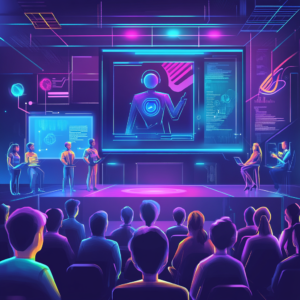1. Introduction
In today’s rapidly evolving digital landscape, I have seen firsthand How AI Revolutionizing eLearning and online education. This article, titled How AI is Revolutionizing Online Education and eLearning, is designed to share my personal insights, practical strategies, and real-world examples that illustrate the transformative impact of artificial intelligence in the education sphere. By leveraging advanced algorithms and data analytics, AI is driving innovation in personalized learning, adaptive assessments, and intelligent tutoring systems. In this comprehensive guide, I will explore the evolution of AI in education, discuss its key benefits, address potential challenges, and provide actionable steps for educators who want to integrate AI into their eLearning platforms. Whether you are an experienced online educator or just beginning your digital teaching journey, understanding How AI Revolutionizing eLearning can empower you to create a more engaging, efficient, and transformative learning experience.

If you want to learn more about innovative trends in digital education, click here to read “10 Innovative eLearning Trends Transforming Education in 2025”.
2. The Evolution of AI in Education
Artificial intelligence has long been a subject of intrigue, but its impact on education has only become truly transformative in recent years. Initially, AI in education was limited to simple automation and data processing tasks. However, with rapid advancements in machine learning, natural language processing, and data analytics, AI now plays a critical role in personalizing and enhancing the educational experience. Today, AI systems analyze vast amounts of student data to identify learning patterns, predict outcomes, and tailor instructional content accordingly. This evolution has led to the development of adaptive learning systems, virtual tutors, and automated grading tools that not only improve the efficiency of online education but also create a more engaging and personalized experience for learners. Embracing these innovations provides clear evidence of How AI Revolutionizing eLearning in modern education.
3. Key Benefits of AI in Online Education and eLearning
3.1 Personalization and Adaptive Learning
One of the most significant benefits of AI in online education is its ability to offer personalized, adaptive learning experiences. Traditional classroom settings often struggle to meet the diverse needs of every student. AI-driven systems, however, analyze individual performance in real time and adjust lessons and assessments accordingly. This ensures that each learner receives content tailored to their strengths, weaknesses, and pace. Such personalized learning paths lead to improved retention and increased engagement, forming a cornerstone of the movement. This adaptive approach is a prime example of How AI Revolutionizing eLearning by making learning more individualized.
3.2 Intelligent Tutoring and Chatbots
AI-powered intelligent tutoring systems and chatbots provide invaluable, round-the-clock support to students. These systems can answer routine questions, guide learners through difficult concepts, and even offer personalized encouragement. For instance, if a student is struggling with a particular topic, an AI chatbot can offer step-by-step explanations and additional resources. This immediate support not only streamlines the learning process but also allows educators to focus on more complex instructional tasks. The integration of intelligent tutoring is a key aspect of How AI Revolutionizing eLearning support systems in education.

3.3 Automated Content Creation and Curation
Another remarkable benefit of AI in education is its capacity to automate content creation and curation. AI tools can generate quizzes, summaries, and even entire lessons based on extensive datasets and existing course materials. This not only saves time for educators but also ensures that the educational content remains up-to-date and relevant. By automatically curating the best available resources, AI enables rapid adaptation to emerging topics and trends, making it a vital element of How AI Revolutionizing eLearning in curriculum development.
3.4 Enhanced Assessment and Analytics
AI is transforming student assessments by providing deeper insights into performance. Traditional tests are now complemented by AI-driven analytics that identify areas of difficulty and recommend targeted interventions. These advanced assessments measure student understanding more accurately and allow for more responsive teaching methods. Detailed analytics empower educators to make data-driven decisions, ensuring every student receives the necessary support. This enhanced approach to evaluation is a hallmark of How AI Revolutionizing eLearning in student assessment and analytics.
3.5 Increased Accessibility and Efficiency
AI improves both accessibility and efficiency in online education. For students with disabilities or specific learning needs, AI-powered tools can offer tailored support such as speech-to-text, text-to-speech, and real-time translation services. These innovations ensure that educational materials are accessible to everyone, promoting inclusivity. Additionally, AI automates routine tasks like grading and scheduling, freeing educators to devote more time to teaching. This boost in efficiency exemplifies How AI Revolutionizing eLearning by enhancing the overall educational experience.
4. Real-World Applications and Case Studies
Across various educational settings, AI is being implemented in innovative ways that showcase its transformative potential. For example, a prominent university integrated an AI-driven adaptive learning platform into its online courses. This system analyzed student performance and automatically adjusted the difficulty of course content, resulting in a 30% improvement in course completion rates and higher student satisfaction. Another case involved an online tutoring company that deployed AI-powered chatbots to provide 24/7 academic assistance. Students reported faster response times and improved understanding of complex topics, leading to better grades and enhanced retention rates. These real-world examples provide clear evidence of How AI Revolutionizing eLearning can lead to significant improvements in both engagement and academic outcomes. For a visual representation of these innovations, I recommend watching this YouTube video on the future of AI in education from a well-recognized channel, which offers compelling insights into how advanced technologies are reshaping learning environments worldwide.
5. Challenges and Ethical Considerations
While the benefits of AI in online education are numerous, there are also challenges and ethical considerations that must be addressed. One primary concern is data privacy—AI systems require large datasets to function effectively, and it is crucial to ensure that this data is managed securely and ethically. There is also the issue of algorithmic bias, where flawed data or design may inadvertently perpetuate inequalities. Moreover, there is a risk that over-reliance on AI may reduce the human element in teaching, which is essential for fostering empathy and nuanced understanding in learners. Addressing these challenges requires transparency, robust data protection measures, and ongoing collaboration between educators, developers, and policymakers to ensure that How AI Revolutionizing eLearning benefits all students equitably.
6. Future Trends in AI for Online Education
Looking forward, the role of AI in education is set to expand even further. Emerging trends include the use of virtual reality (VR) and augmented reality (AR) to create immersive, interactive learning environments. Imagine a virtual lab where students can conduct experiments in a safe, digital space, or an AR application that brings historical events to life right in the classroom. Additionally, advanced AI-driven predictive analytics will enable even more precise tracking of student progress, allowing for timely and targeted interventions. Improvements in natural language processing will result in more sophisticated virtual tutors that interact with students in a human-like manner. These future trends will further solidify the impact of How AI Revolutionizing eLearning by offering unparalleled levels of personalization, accessibility, and efficiency in education.

Advanced Integration of Analytics and Immersive Technologies
Advanced Integration of Analytics and Immersive Technologies is transforming eLearning by merging data-driven insights with cutting-edge digital experiences. AI-powered platforms now combine advanced analytics with immersive technologies such as VR and AR to create personalized, engaging learning journeys. These systems not only monitor real-time performance metrics but also adjust instructional content dynamically based on individual learning behaviors and predictive trends. For instance, through detailed analytics, educators can identify subtle learning gaps and intervene promptly with targeted resources, ensuring every student benefits from a customized experience. Simultaneously, immersive technologies offer students the opportunity to participate in simulated environments where they can experiment and learn in ways that traditional classrooms cannot replicate. Imagine a virtual lab where complex scientific experiments are conducted safely in a digital space, or an AR experience that brings historical events to life, providing students with contextual, hands-on learning. Additionally, this integration facilitates robust feedback mechanisms where student engagement is continuously measured and optimized, contributing to an iterative cycle of improvement in both teaching methods and learning outcomes. This synergy of analytics and immersive tech not only enhances engagement and retention but also paves the way for a new era of personalized education that adapts fluidly to the evolving needs of modern learners.
7. Steps to Implement AI in Your eLearning Platform
Integrating AI into your online education framework can be straightforward if approached methodically. Here are some practical steps based on my experience: 1. Assess Your Needs: Evaluate your current educational approach and identify gaps where AI can add value—whether in adaptive learning, intelligent tutoring, or automated assessments. 2. Select the Right Tools: Research and choose AI-powered tools and platforms that align with your goals. Look for solutions that are scalable, secure, and have a proven track record in education. 3. Train Your Educators: Provide comprehensive training for your faculty on how to effectively integrate AI into their teaching practices. This could involve workshops, online courses, or peer mentoring sessions. 4. Pilot and Evaluate: Begin with a pilot program to test AI tools with a small group of students. Gather feedback, assess performance metrics, and refine your approach before scaling up. 5. Scale Gradually: Expand AI integration across courses based on pilot success, continuously monitoring engagement and outcomes to ensure sustained improvements. 6. Ensure Data Privacy and Ethical Use: Implement robust security measures and maintain transparency with students regarding data usage to ensure ethical and compliant AI applications. By following these steps, you can effectively implement AI in your eLearning platform and contribute to the ongoing evolution of online education. This practical roadmap is another way to show How AI Revolutionizing eLearning is a game-changer for educators.
8. Conclusion
In conclusion, AI is fundamentally transforming online education and eLearning by introducing unprecedented levels of personalization, efficiency, and interactivity. The integration of adaptive learning, intelligent tutoring, automated content creation, and advanced analytics is revolutionizing how educators teach and how students learn. While challenges such as data privacy and ethical concerns remain, thoughtful and responsible implementation of AI can yield significant benefits. I encourage you to explore how AI can be incorporated into your educational practice and to continuously experiment with new technologies. Embracing How AI Revolutionizing eLearning is not just about adopting cutting-edge tools—it’s about reimagining the entire learning experience to create a more engaging, accessible, and effective environment for every student. I would like to mention a top-notch digital product that has significantly improved my approach to communication. It is a comprehensive infoproduct that offers detailed strategies and practical tools to improve communication. Also, if you haven’t already, I invite you to sign up for our newsletter [INSERT NEWSLETTER SIGN-UP LINK] to receive exclusive tips, updates, and insights that will help you navigate the future of online education. In summary, understanding How AI Revolutionizing eLearning is essential for modern educators.
9. Frequently Asked Questions (FAQ)
Q1: What is the role of AI in online education?
A1: AI enhances online education by personalizing learning experiences, automating assessments, and providing real-time feedback, among other benefits.
Q2: How does AI contribute to personalized learning?
A2: AI systems analyze individual student data and adapt learning content accordingly, ensuring that each learner receives a tailored educational experience.
Q3: What are some examples of AI tools used in eLearning?
A3: Examples include adaptive learning platforms, intelligent tutoring systems, chatbots, virtual assistants, and automated grading systems.
Q4: Are there challenges associated with implementing AI in education?
A4: Yes, challenges include data privacy concerns, potential algorithmic bias, the need for continuous teacher training, and ensuring ethical AI usage.
Q5: What future trends can we expect in AI for education?
A5: Future trends include greater use of VR/AR for immersive learning, enhanced predictive analytics for personalized education, and more sophisticated AI-powered virtual tutors.
Thank you for reading this comprehensive guide on How AI is Revolutionizing Online Education and eLearning. I hope the insights and techniques shared here inspire you to integrate AI into your online education strategy and create a more personalized, efficient, and engaging learning environment. Throughout this article, I have highlighted how How AI Revolutionizing eLearning transforms every aspect of online education—from personalization and intelligent tutoring to automated content creation and enhanced assessments. If you have any questions or need further adjustments, please let me know!
